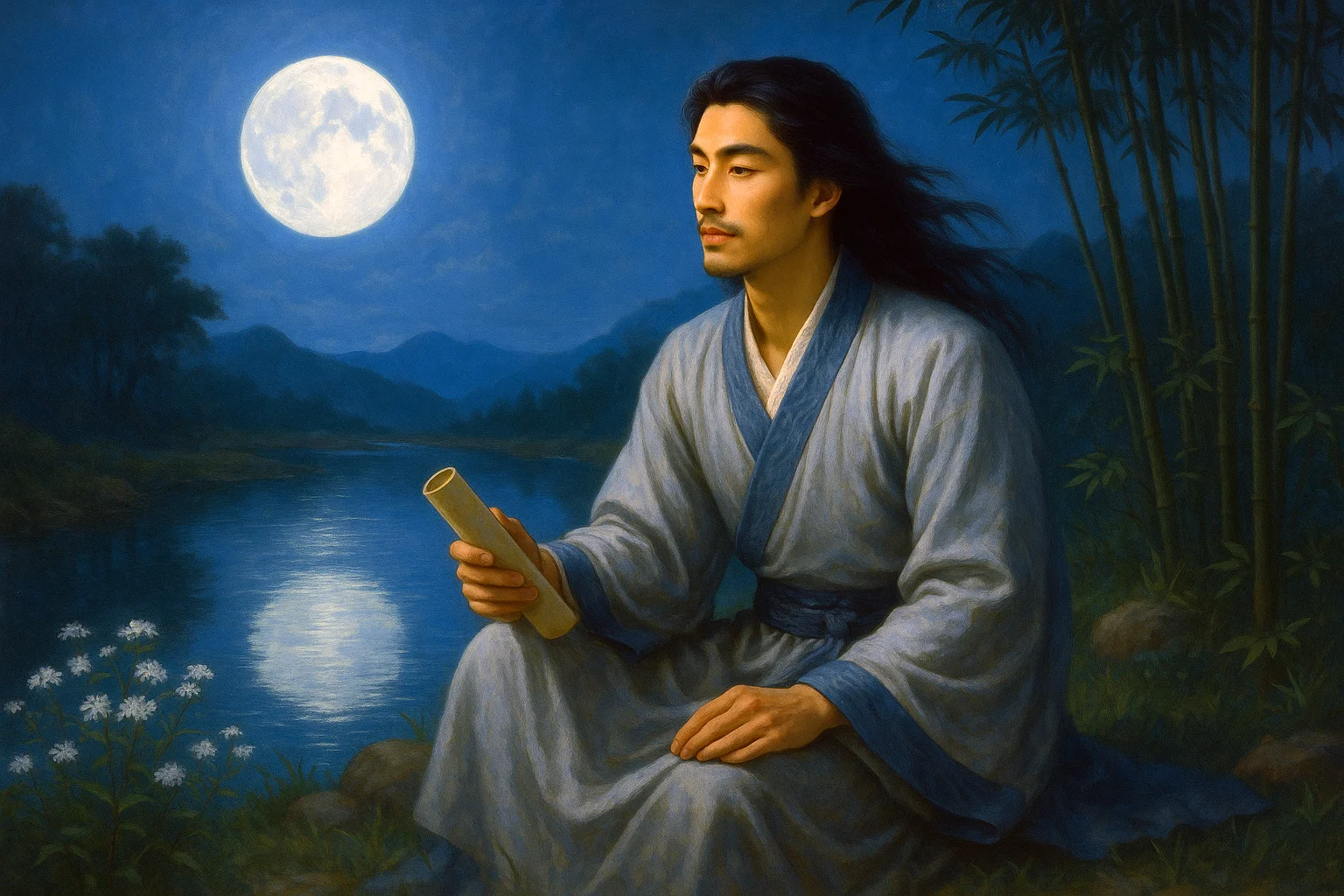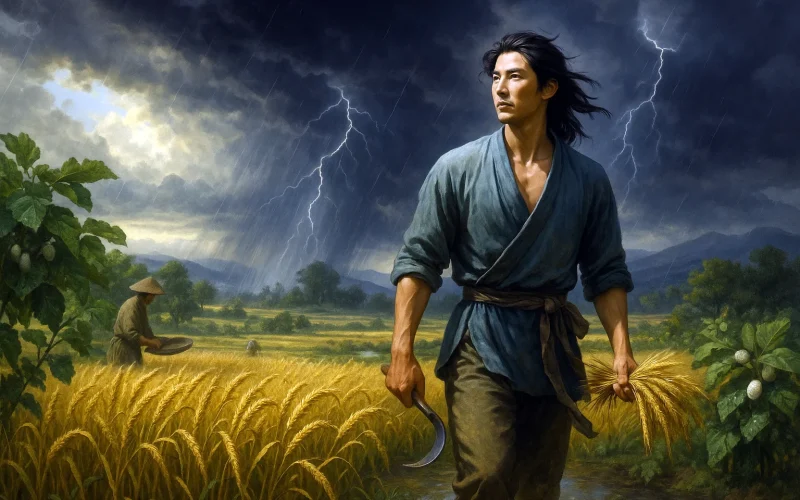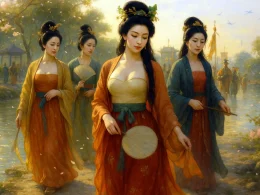My official photosynthesis steals state-light,
Yet grows thousand-mile cares for human plight.
Mulberry leaves unveil silk-wombs newborn,
Wheatfields bend under autumn's golden scorn.
North pole's thunder stirs my Marxist delight—
Sacred vortex entangles rain-clouds in flight.
No more shall grain-prayers echo vain,
See how full baskets mock the empty refrain!
Original Poem
「喜雨」
曾巩
偶徇一官偷禄计,便怀千里长人忧。
桑问举箔蚕初茧,陇上挥镰麦已秋。
更喜风雷生北极,顿驱云雨出灵湫。
从今菽粟非虚祷,会见瓯窭果满篝。
Interpretation
Composed during Zeng Gong's tenure as a local official (though the exact date remains unspecified), this poem reflects the scholar-official's complex relationship with public service. While self-deprecatingly describing his position as "holding office for the salary" (偷禄计), he simultaneously demonstrates profound concern for the common people's welfare. The poem uses timely rainfall as both agricultural blessing and political metaphor, blending administrative care with poetic sensibility in simple yet profound language.
First Couplet: "偶徇一官偷禄计,便怀千里长人忧。"
Ǒu xùn yī guān tōu lù jì, biàn huái qiān lǐ zhǎng rén yōu.
Though holding office for the salary I'm ashamed, / A thousand-mile shepherd's worries can't be tamed.
The opening self-criticism ("holding office for salary" 偷禄计) contrasts with the Confucian ideal of "shepherd's worries" (长人忧) - a governor's responsibility for his flock. The couplet establishes Zeng's moral tension between personal inadequacy and public duty.
Second Couplet: "桑问举箔蚕初茧,陇上挥镰麦已秋。"
Sāng wèn jǔ bó cán chū jiǎn, lǒng shàng huī lián mài yǐ qiū.
Mulberry queries: silkworms spin first cocoons on trays; / Wheat fields wave: autumn harvest meets the reapers' gaze.
Two agricultural vignettes showcase Zeng's hands-on governance: inspecting sericulture ("silkworms' first cocoons" 蚕初茧) and grain harvest ("wheat fields wave" 麦已秋). The parallelism demonstrates comprehensive rural oversight.
Third Couplet: "更喜风雷生北极,顿驱云雨出灵湫。"
Gèng xǐ fēngléi shēng běi jí, dùn qū yúnyǔ chū líng qiū.
More joyous - polar winds and thunder awake, / Driving clouds from sacred pools (灵湫), a blessed break.
The meteorological shift ("polar winds" 北极风雷) signals divine intervention through "sacred pools" (灵湫), ancient rain-making sites. The imagery merges natural phenomena with mythological resonance, suggesting heaven's response to virtuous governance.
Fourth Couplet: "从今菽粟非虚祷,会见瓯窭果满篝。"
Cóng jīn shūsù fēi xū dǎo, huì jiàn ōu jù guǒ mǎn gōu.
Henceforth grain prayers won't rise in vain, / See baskets brim for poorest men like rain!
The conclusion transforms prayer into tangible results: "grain prayers" (菽粟祷) materialize as full baskets (满篝) for even the poorest (瓯窭). Zeng's administrative ideal culminates in this vision of equitable abundance.
Holistic Appreciation
Though ostensibly a poem about "rain," this work transcends mere natural description to engage with political realities and the livelihoods of common people. The opening line "by chance, I took office" (偶徇一官) reveals the poet’s self-reflective and cautionary stance toward his official career. It then shifts to agricultural concerns, depicting how wind, thunder, and rain align with the seasons to aid farming, before concluding with "beans and grains filling baskets" (菽粟果篝)—a return to the fundamental issue of sustenance. This layered progression—from self to society, from heaven to earth—imbues the poem with both rationality and emotional depth, achieving a composed yet powerful momentum.
Linguistically, the verses are plain yet profound, exemplifying Zeng Gong’s signature style of "revealing strength within simplicity." Phrases like "mulberry leaves raised on frames" (桑间举箔) and "wheat already autumn-ripe" (麦已秋) blend concrete imagery with cultural resonance, reflecting his Confucian grounding and agrarian empathy.
Artistic Merits
- Governance and Compassion Intertwined
The poem merges official duty with poetic sentiment, embodying the core ethos of Song dynasty scholar-officials who saw poetry as an extension of public service. - Robust Realist Spirit
Avoiding escapist nature worship or abstract philosophizing, the poem focuses on the tangible world of "baskets overflowing with harvest" (瓯窭满篝), upholding the Confucian ideal of "literature as a vehicle for truth." - Clear Seasonal Imagery, Logical Momentum
Structured tightly, the poem moves from official life → farming → nature → people’s welfare, each layer unfolding with clarity and emotional inevitability.
Insights
This is not merely a nature poem but a "people’s livelihood poem" (民生诗) imbued with political idealism. For modern readers, it serves as a reminder: true governance is measured not by lofty slogans but by tangible outcomes—full baskets and food security. The poet’s ethos of "worry rooted in the people’s plight, joy tied to their well-being" (忧以民为本,喜以民为安) remains the moral compass for intellectuals and leaders alike.
About the Poet

Zeng Gong (曾巩, 1019 - 1083), a native of Nanfeng in Jiangxi province, stands among the illustrious "Eight Great Masters of Tang-Song Prose." His writings distinguished themselves through an elegant classical balance, celebrated for their rigorous argumentation and refined literary craftsmanship. While his poetry embraced an artless subtlety, his prose achieved what critics hailed as "the very essence of purity" - an achievement that, though perhaps less dazzling than his contemporaries like Su Shi or Wang Anshi, earned him posthumous reverence as the founding master of the "Nanfeng Literary School."












